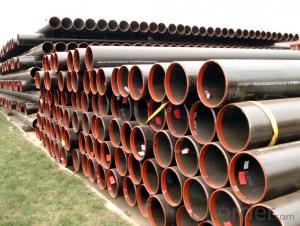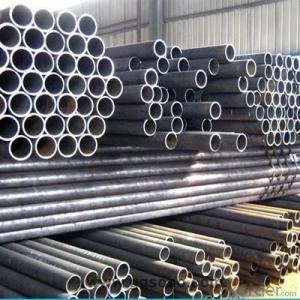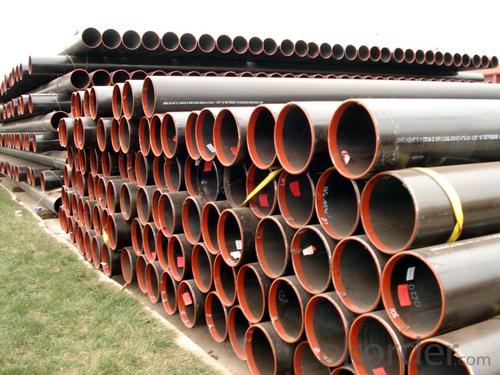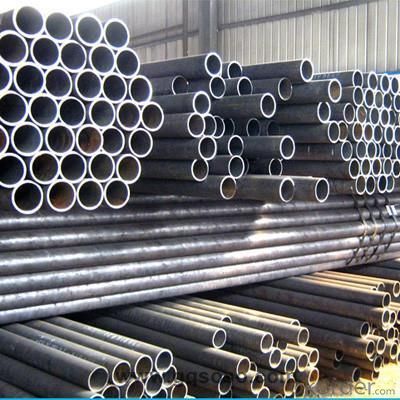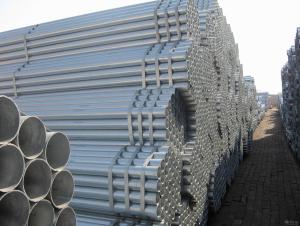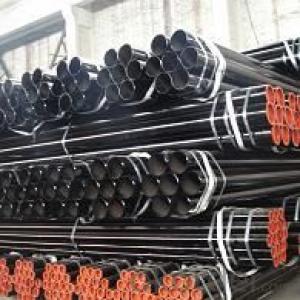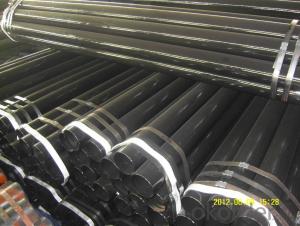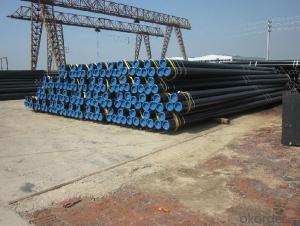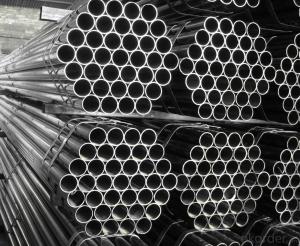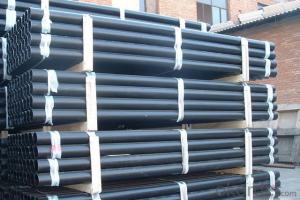API GRADE B CARBON STEEL SEAMLESS PIPES
- Loading Port:
- Tianjin
- Payment Terms:
- TT OR LC
- Min Order Qty:
- 100 m.t.
- Supply Capability:
- 1000 m.t./month
OKorder Service Pledge
OKorder Financial Service
You Might Also Like
1.Structure of Seamless Steel Pipe Description:
A large amount of Seamless Steel Pipes is offered to the clients at cost effective rates. These pipes are extremely durable, resistant to corrosion and have high tensile strength. Our pipes are used in nuclear plants, power plants, refineries and construction industry across the country. Furthermore, we are capable of providing these seamless pipes to the clients in bulk quantity.
2.Main Features of the Steel Pipe:
• High manufacturing accuracy
• High strength
• Small inertia resistance
• Strong heat dissipation ability
• Good visual effect
•Reasonable price
3.Packaging & Delivery:
| Packaging Details: | Seaworthy packages, bundles wrapped with strong steel strip |
| Delivery Detail: | 15-30 days after received 30% TT |
4.Seamless Steel Pipe Specification:
| Standard: | GB, DIN, ASTM,ASME, ASTM A106-2006, ASTM A53-2007 |
| Grade: | 10#,20#, 45#, 16Mn |
Thickness: | 8 - 33 mm |
| Section Shape: | Round |
| Outer Diameter: | 133 - 219 mm |
| Place of Origin: | Shandong, China (Mainland) |
| Secondary Or Not: | Non-secondary |
| Application: | Hydraulic Pipe |
| Technique: | Cold Drawn |
| Certification: | API |
| Surface Treatment: | factory state or painted black |
| Special Pipe: | API Pipe |
| Alloy Or Not: | Non-alloy |
| Length: | 5-12M |
| Outer Diameter: | 21.3-610mm |
5.Product pictures
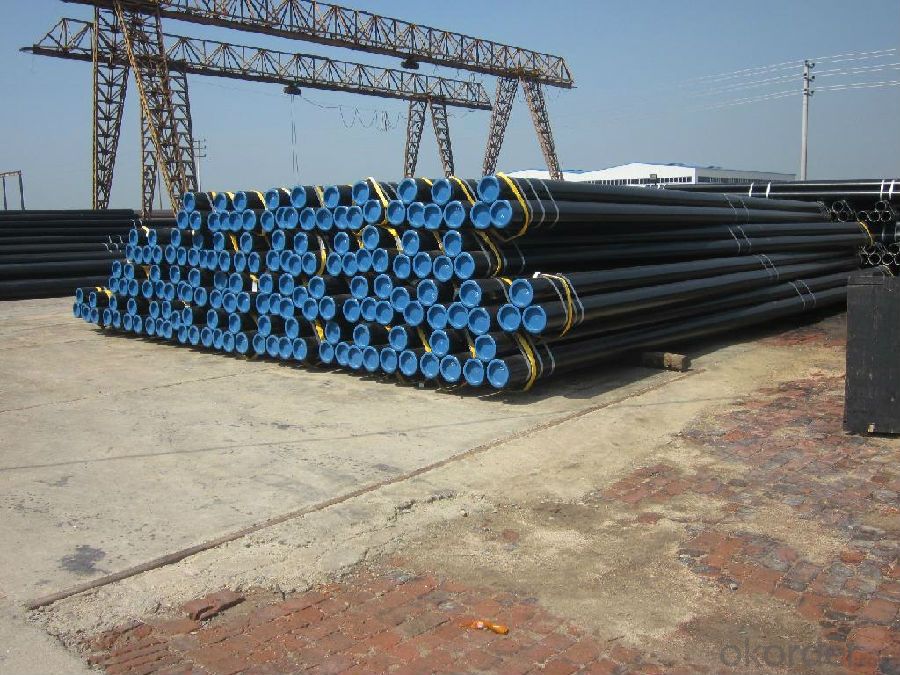
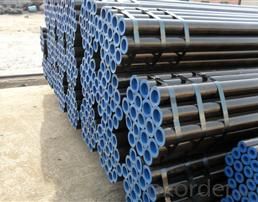
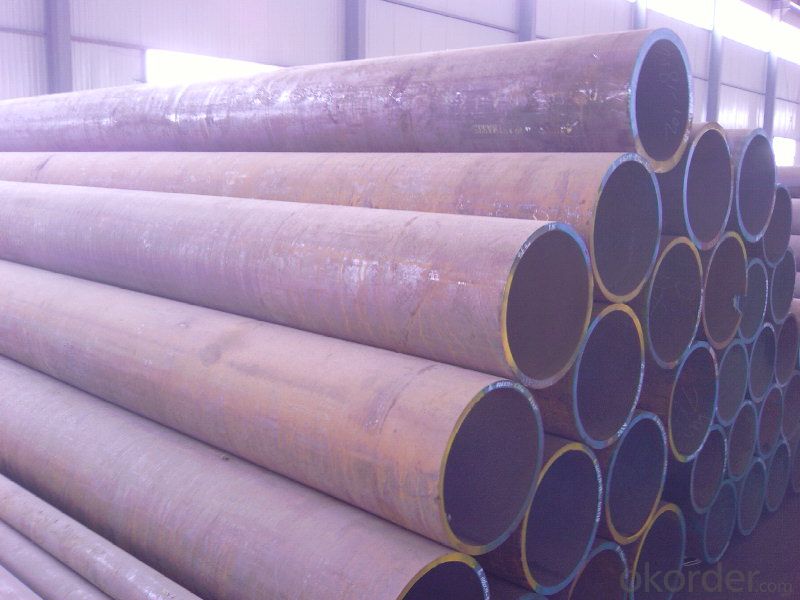
6.FAQ of Seamless steel pipe:
①How is the quality of your products?
Our products are manufactured strictly according to national and internaional standard, and we take a test
on every pipe before delivered out. If you want see our quality certifications and all kinds of testing report, please just ask us for it.
Guaranteed: If products’ quality don’t accord to discription as we give or the promise before you place order, we promise 100% refund.
②How about price?
Yes, we are factory and be able to give you lowest price below market one, and we have a policy that “ for saving time and absolutely honest business attitude, we quote as lowest as possible for any customer, and discount can be given according to quantity”,if you like bargain and factory price is not low enough as you think, just don’t waste your time.Please trust the quotation we would give you, it is professional one.
③Why should you chose us?
Chose happens because of quality, then price, We can give you both.Additionally, we can also offer professional products inquiry, products knowledge train(for agents), smooth goods delivery, exellent customer solution proposals.Our service formula: good quality+good price+good service=customer’s trust.
SGS test is available, customer inspection before shipping is welcome, third party inspection is no problem.
Any question, pls feel free to contact us !
- Q: What are the different methods of pipe cutting for steel pipes?
- There are several methods of pipe cutting for steel pipes, each suited for different situations and requirements. Some of the most common methods include: 1. Manual Pipe Cutters: These handheld tools are commonly used for cutting smaller diameter steel pipes. They typically feature a cutting wheel that is rotated around the pipe, gradually creating a groove until the pipe is cut through. Manual pipe cutters are portable and relatively easy to use, making them suitable for on-site cutting tasks. 2. Hacksaw: Using a hacksaw is a traditional and cost-effective method for cutting steel pipes. This method requires physical effort and time, but it can be effective for cutting pipes with smaller diameters. It is important to use a fine-toothed blade and apply steady pressure to ensure a clean and precise cut. 3. Reciprocating Saw: Also known as a sawzall, a reciprocating saw is a power tool that uses a back-and-forth cutting motion to quickly and efficiently cut through steel pipes. These saws are versatile and can be used with different types of blades to handle different pipe sizes and thicknesses. 4. Band Saw: Band saws are commonly used in industrial settings for cutting large steel pipes. These saws feature a continuous loop of teethed metal blade that runs on wheels, allowing for precise and rapid cutting. Band saws are ideal for cutting large-diameter pipes and can be manually operated or fully automated for high-volume cutting tasks. 5. Pipe Cutting Machines: To achieve accurate and consistent cuts, pipe cutting machines are often used. These machines are designed to cut steel pipes with speed and precision, making them ideal for large-scale industrial applications. Depending on the specific machine and requirements, different cutting methods such as abrasive cutting, flame cutting, or plasma cutting can be employed. It is important to note that the choice of pipe cutting method depends on factors such as pipe diameter, thickness, location, precision requirements, and available resources. Proper safety precautions should always be followed when working with any cutting method to avoid injury or damage to the pipes.
- Q: How are steel pipes used in tunnel construction?
- Steel pipes are commonly used in tunnel construction for various purposes such as drainage, ventilation, and support. These pipes are installed to facilitate the removal of water from the tunnel, ensuring a dry working environment. They also serve as conduits for supplying fresh air and removing exhaust fumes. Additionally, steel pipes are utilized as structural supports, providing stability and reinforcement to the tunnel walls and ceilings.
- Q: What's the difference between straight steel pipe and seamless steel pipe?
- The welded pipe is made of rolled steel plates, and small ones are straight welded, and big ones are spiral welded. Because the welded pipe has weld, the mechanical performance of weld is poor, so its applicable range is limited, but its price is cheap. Significant difference is that there are welded pipe, seamless steel pipe is not, of course, the welded pipe treatment of good, layman do not see the difference.
- Q: How are steel pipes used in the manufacturing of storage tanks?
- Steel pipes are commonly used in the manufacturing of storage tanks due to their high strength, durability, and resistance to corrosion. These pipes are typically used as the main structural component of the tank, providing the necessary strength to support the weight of the stored materials. Additionally, steel pipes can be easily welded together, allowing for the construction of large, seamless tanks that can hold various liquids or gases. Overall, steel pipes play a crucial role in ensuring the integrity and longevity of storage tanks.
- Q: What are the different types of steel pipe supports?
- There are several types of steel pipe supports, including pipe hangers, pipe clamps, pipe saddles, pipe brackets, and pipe supports with rollers.
- Q: How to make the steel pipe spray paint is not easy to fall off?
- You're not usually advised to do it yourself, because you can't do it yourself. General powder coating, spray before the treatment is very strict, to be high temperature baking, and their spraying are dry paint, it does not add hardening agent, that is, the surface dry, but not hard, not wear-resistant. So don't scrape off the paint, or you'll look good after spraying, and it will be ugly in a few days,.If you really like to look good, you can buy some stickers back to paste, without affecting the appearance..
- Q: How are steel pipes used in the chemical industry?
- Steel pipes are extensively used in the chemical industry for various applications, including transportation of chemicals, gases, and liquids. They are highly durable, corrosion-resistant, and can withstand high pressure and temperature conditions. Steel pipes are used in chemical plants for the transfer of raw materials, intermediate products, and final products within the production process. They are also employed for the distribution of utilities such as water, steam, and compressed air. Additionally, steel pipes are utilized for the construction of storage tanks, reactors, and other equipment in the chemical industry due to their strength and reliability.
- Q: What are the safety measures to be followed while working with steel pipes?
- When working with steel pipes, it is important to follow several safety measures to ensure the well-being of workers and prevent accidents. Some of the key safety measures include: 1. Personal Protective Equipment (PPE): Workers should always wear appropriate PPE, including safety glasses, steel-toed boots, gloves, and hard hats to protect themselves from potential hazards. 2. Proper Lifting Techniques: Steel pipes can be heavy, so workers should use proper lifting techniques, such as bending their knees and using their leg muscles, to prevent strain or injury to their back. 3. Secure Storage and Handling: Steel pipes should be stored in a secure and organized manner to prevent them from falling or causing any hazards. Workers should also use appropriate lifting equipment, such as cranes or forklifts, to handle heavy steel pipes safely. 4. Inspect Pipes for Defects: Before working with steel pipes, they should be inspected for any defects, such as cracks or corrosion, that could compromise their structural integrity. Damaged pipes should be replaced to avoid potential accidents. 5. Proper Welding and Cutting Techniques: When welding or cutting steel pipes, workers should follow proper techniques and use appropriate safety equipment, such as welding masks and fire-resistant clothing, to prevent burns, fires, or explosions. 6. Fall Protection: When working at heights or on elevated platforms, workers should use fall protection equipment, such as harnesses and safety nets, to prevent falls and injuries. 7. Adequate Ventilation: In enclosed spaces where welding or cutting activities take place, proper ventilation should be ensured to prevent the accumulation of harmful fumes or gases. 8. Fire Prevention: Steel pipes can be flammable, especially when cutting or welding. Therefore, it is crucial to have fire prevention measures in place, such as fire extinguishers and fire blankets, and to follow proper fire safety protocols. By adhering to these safety measures, workers can minimize the risks associated with working with steel pipes and create a safer working environment.
- Q: What are the different standards for steel pipes?
- There are several different standards for steel pipes, including ASTM (American Society for Testing and Materials), API (American Petroleum Institute), and ASME (American Society of Mechanical Engineers). These standards specify the requirements for various aspects of steel pipes, such as their dimensions, chemical composition, mechanical properties, and testing procedures. These standards ensure that steel pipes meet the necessary quality and safety standards for their intended applications.
- Q: Can steel pipes be used for underground utility lines?
- Yes, steel pipes can be used for underground utility lines. Steel pipes are commonly used for various underground applications, including utility lines for water, gas, and sewage. They are durable, strong, and resistant to corrosion, making them suitable for long-term use in underground environments. Additionally, steel pipes can be easily welded and connected, allowing for efficient installation and maintenance.
Send your message to us
API GRADE B CARBON STEEL SEAMLESS PIPES
- Loading Port:
- Tianjin
- Payment Terms:
- TT OR LC
- Min Order Qty:
- 100 m.t.
- Supply Capability:
- 1000 m.t./month
OKorder Service Pledge
OKorder Financial Service
Similar products
Hot products
Hot Searches
Related keywords
